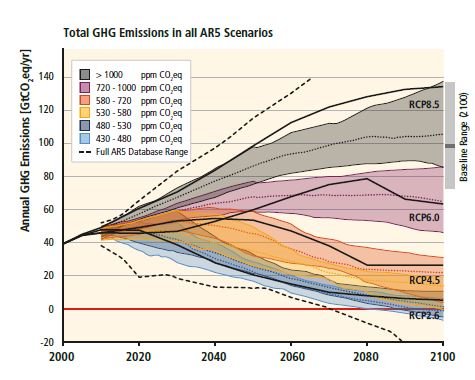
What does RCP8.5 even mean? Good question. It doesn’t mean just one thing. Here is a Twitter thread I did on nomenclature of RCP8.5, start there,
In 2018 a paper of mine on climate policy — my first after going walkabout from climate writing for a few years — discussed how assumptions of so-called “integrated assessment models” served to limit our discussion of climate policy:
- Opening Up the Climate Policy Envelope (2018): “A third example of a key assumption used to reinforce the boundaries of the business-as-usual climate policy envelope has been the heavy reliance on a particular emission scenario, called RCP (Representative Concentration Pathway) 8.5, in climate impact studies.”
Here are quick links to the series of articles I’ve had so far on RCP8.5 at Forbes.
- 26 Sept 2019: “The misuse of RCP 8.5 involves the transformation of what is more accurately described as a worst-case scenario into the sole “business as usual” or baseline scenario that has become a centerpiece of climate policy discussions.”
- 7 Oct 2019: “One way that integrated assessment models warp our discussion of climate policies is through the pervasive use of what are called “baseline scenarios.””
- 21 Oct 2019: “What is clear is that, to date, the vast majority of IPCC scenarios are far more aggressive in their projections of economic growth than has been observed.”
- 30 Nov 2019: “It is hard to overstate the importance of the shift in expectations for future emissions that is represented by the difference in the new IEA scenarios versus those of the IPCC.”
- 6 Dec 2019: “The decision by the IPCC to center its fifth assessment report on its most extreme scenario has been incredibly consequential.”
- 22 Dec 2019: “The climate community got off track by forgetting the distinction between using scenarios as an exploratory tool for developing and evaluating policy options, and using scenarios as forecasts of where the world is headed.”
- 23 Dec 2019: “The three recommendations made here – to return to actual scenario planning, to eschew the idea of using a baseline view of the future to ground policy analyses and expanding the IPCC role in discussing policy options – would represent a marked change from how the climate science community has evolved to support policy makers.”
- 2 Jan 2020: “In fact, what is going on here is absolutely genius. We have a well-funded effort to fundamentally change how climate science is characterized in the academic literature, how that science is reported in the media, and ultimately how political discussions and policy options are shaped.”
Comments and critique are welcomed.

Important work. Good luck on getting the issue acknowledged.
LikeLike